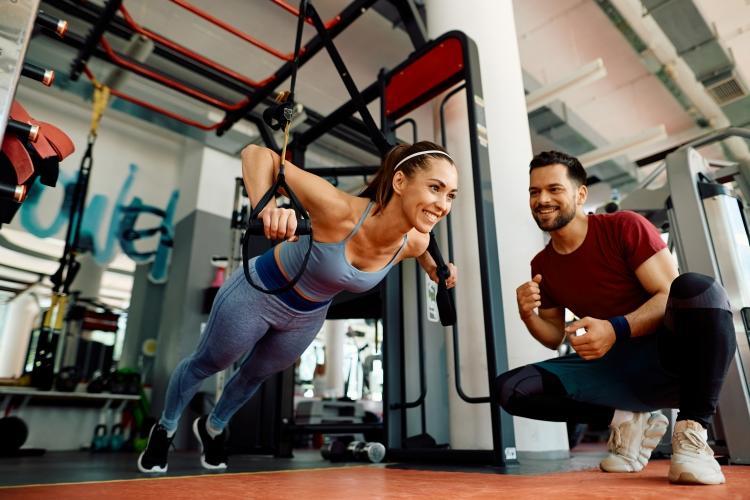Personal Trainer For Women: The Ultimate Guide to Personal Training for Women
Personal Trainer For Women. In today’s fast-paced world, where health and wellness are at the forefront of our minds, personal training has emerged as a key player in helping individuals achieve their fitness goals.
For women finding a personal training program that caters to their unique needs and goals can be transformative. This blog delves into the world of personal training for women, offering insights, benefits, and tips to empower women on their fitness journey.
Why Choose A Personal Trainer For Women?
Personal training goes beyond generic workout routines; it offers a customized approach to fitness that considers a woman’s physiological, nutritional, and emotional health. Here’s why it stands out:
- Customized Fitness Plans: Personal training provides tailored fitness programs that take into account a woman’s body composition, fitness level, and personal health goals, ensuring more effective and sustainable results.
- Understanding Women’s Health: Personal trainers specialized in women’s fitness have a deep understanding of female physiology, including hormonal fluctuations and specific health concerns, allowing them to adapt workouts accordingly.
- Safety and Technique: A personal trainer ensures exercises are performed with correct form, reducing the risk of injury and maximizing the effectiveness of each workout.
- Motivation and Accountability: Regular sessions with a personal trainer provide not only motivation but also accountability, helping women stay committed to their fitness goals.
- Holistic Approach: Personal training for women often incorporates a holistic approach, focusing on nutrition, stress management, and lifestyle habits, contributing to overall well-being.

Benefits of a Personal Trainer for Women
Engaging in a personal training program can offer numerous benefits, including:
Personal training offers a myriad of benefits tailored to meet the unique health and fitness needs of women. Engaging a personal trainer can lead to significant improvements in physical health, mental wellness, and overall quality of life. Here are some of the key benefits of having a personal trainer for women:
1. Personal Trainer For Women Customized Fitness Programs
- Tailored Approach: Personal trainers create customized workout plans that consider a woman’s specific fitness goals, body composition, and any health concerns, ensuring more effective and efficient results.
- Adaptability: Programs are adjusted over time to reflect progress, prevent plateaus, and continuously challenge the body in new ways.
2. Increased Motivation and Accountability
- Consistency: Having scheduled sessions with a personal trainer helps in maintaining a consistent workout routine.
- Encouragement: Personal trainers provide the encouragement and motivation needed to push through tough workouts and stay committed to fitness goals.
3. Enhanced Safety and Injury Prevention
- Proper Form and Technique: Trainers ensure exercises are performed correctly, reducing the risk of injuries and maximizing the benefits of each movement.
- Knowledge of Female Physiology: Trainers with experience in women’s fitness understand the physical nuances and can tailor workouts to prevent strain on sensitive areas, such as the pelvic floor.
4. Support Through Life Transitions
- Life Stages: Personal trainers can adapt fitness programs to support women through various life stages, including pregnancy, postpartum, menopause, and beyond.
- Health Conditions: They can also tailor exercises to manage or improve health conditions such as osteoporosis, arthritis, and cardiovascular disease.
5. Personal Trainer For Women Improved Mental Health
- Stress Reduction: Regular physical activity is known to reduce stress levels, contributing to better mental health.
- Confidence Boost: Achieving fitness goals can significantly improve self-esteem and body image, leading to a more positive outlook on life.
6. Nutritional Guidance
- Holistic Approach: Many personal trainers also provide or can refer to nutritional counseling, offering a more holistic approach to health and fitness.
- Dietary Adjustments: They can help implement dietary changes that complement fitness goals, such as weight loss, muscle gain, or improved energy levels.
7. Flexibility in Training
- Location: Personal trainers can offer flexibility in terms of where you work out, including gyms, homes, or outdoor settings.
- Schedule: They can work around your schedule, making it easier to fit workouts into a busy lifestyle.
8. Educational Resource
- Learning: Trainers educate clients on the principles of fitness and nutrition, empowering them to make informed decisions about their health.
- Skill Development: Women learn new exercise techniques and how to use various fitness equipment, skills that are beneficial for lifelong health and fitness.
9. Social Support
- Positive Relationship: The trainer-client relationship can offer social support, which is an important aspect of overall well-being.
- Community Connection: Trainers often facilitate connections with other like-minded individuals, which can be particularly motivating and enriching.

Choosing the Right Personal Trainer For Women
Finding the right personal trainer is crucial. Here are some tips:
Choosing the right personal trainer is a critical step in embarking on a successful and fulfilling fitness journey, especially for women. Personal training can be a significant investment in time, effort, and finances, so it’s essential to find someone who understands your unique needs, goals, and concerns. Here are key considerations and steps to help you select a personal trainer who can guide, motivate, and support you effectively.
1. Identify Your Fitness Goals
Start by clearly defining what you hope to achieve with personal training. Whether it’s weight loss, strength building, improving flexibility, or preparing for a specific event, knowing your goals will help you find a trainer with the expertise in those areas.
2. Look for Specialized Experience
Seek a trainer with experience and credentials in women’s fitness. Trainers who specialize in female physiology, pre- and post-natal fitness, menopause, or other areas relevant to women can offer more tailored guidance and support.
3. Check Qualifications and Certifications
Ensure the personal trainer holds current certifications from reputable organizations such as the National Academy of Sports Medicine (NASM), American Council on Exercise (ACE), or International Sports Sciences Association (ISSA). Additional qualifications in nutrition, women’s health, or specific fitness methodologies can also be beneficial.
4. Consider Their Approach to Fitness
Every trainer has a unique approach to fitness and training. Some may focus more on high-intensity workouts, while others might prioritize holistic wellness, incorporating elements like yoga, Pilates, or mindfulness into their sessions. Choose a trainer whose philosophy aligns with your preferences and goals.
5. Evaluate Communication Style
Effective communication is key to a successful trainer-client relationship. During initial consultations, pay attention to how well the trainer listens and responds to your concerns and questions. A good trainer should make you feel heard, respected, and motivated.
6. Ask About Their Approach to Nutrition and Lifestyle
Many trainers also provide guidance on nutrition and lifestyle changes to complement your training program. If this is important to you, look for a trainer with expertise in these areas. However, ensure they have the proper credentials to offer dietary advice.
7. Inquire About Their Experience with Similar Clients
Ask potential trainers about their experience working with clients who have similar goals or challenges as yours. Trainers who have successfully helped other women achieve goals similar to yours are likely to understand your needs better.
8. Discuss Availability and Flexibility
Your schedules should align. Discuss the trainer’s availability, including days and times they can work with you, and ensure it fits your schedule. Flexibility in rescheduling sessions and their policy on cancellations are also important factors to consider.
9. Understand the Cost
Personal training can vary significantly in price. Get a clear understanding of the cost per session, package deals, and what is included in the price, such as gym access or additional online support. Ensure the investment is within your budget and worth the services provided.
Choosing a personal trainer is a personal decision that should be made with careful consideration of your health, fitness goals, and personal preferences. Taking the time to research and select the right trainer can lead to a rewarding and successful partnership that not only meets but exceeds your fitness aspirations.

Personal Trainer For Women: FAQ
1. Why should women consider personal training?
Personal training offers tailored fitness strategies designed to meet individual health goals, accommodate unique physiological needs, and address specific concerns such as weight management, strength building, and improving overall health. For women, it provides the added advantage of workouts adjusted for their unique body compositions, hormonal fluctuations, and life stages.
2. Can personal training help with weight loss?
Yes, personal trainers can develop customized workout programs that focus on fat loss, muscle building, and metabolism improvement, complemented by nutrition guidance. This holistic approach is effective for sustainable weight loss.
3. Is personal training suitable for all ages and fitness levels?
Absolutely. Personal trainers are skilled in creating adaptable fitness plans that cater to various ages, fitness levels, and health conditions. Whether you’re a beginner, returning to exercise after a break, or looking to challenge yourself further, a personal trainer can design a program that’s right for you.
4. How often should I meet with my personal trainer?
The frequency of sessions can vary based on your fitness goals, schedule, and budget. Typically, meeting 2-3 times a week can offer noticeable progress, but even once a week with personalized guidance for independent workouts can be beneficial.
5. What should I look for in a personal trainer?
Seek a trainer with certifications from recognized fitness organizations, experience in women’s fitness, and an understanding of female physiology. Compatibility in communication and training style is also crucial for a successful partnership.
6. What kind of results can I expect from personal training?
Results can include improved strength, weight loss, enhanced flexibility, better posture, increased energy levels, and a reduction in health risk factors. The timeline for seeing results varies but with consistency, improvements are often noticeable within a few weeks.
7. Will my personal trainer also provide nutrition advice?
Many personal trainers offer nutrition guidance or can work alongside nutritionists to offer comprehensive health advice. However, it’s important to ensure they have the appropriate qualifications to provide dietary recommendations.
8. How does personal training cater to pre-existing health conditions?
Qualified trainers can design programs that not only accommodate but also benefit various health conditions by improving strength, flexibility, and cardiovascular health. Always disclose any health issues to your trainer to ensure a safe and effective workout plan.
9. What happens if I don’t see immediate results?
Fitness journeys are personal and progress can vary. A good trainer will reassess and adjust your program as needed, ensuring continuous progress towards your goals. Patience and consistency are key.
10. How can I start with a personal trainer?
Begin by identifying your fitness goals and any specific needs or preferences you have. Research trainers with relevant experience and qualifications, and look for reviews or testimonials. Most trainers offer a consultation to discuss goals and assess compatibility, which is a great way to start.

Personal Trainer For Women: Conclusion
Embarking on a personal training journey begins with setting clear, achievable goals. Whether it’s improving strength, losing weight, or simply enhancing overall well-being, defining your objectives will guide the customization of your fitness program. It’s also important to keep an open mind and be prepared to embrace new challenges and routines that your personal trainer may introduce.
Personal training for women is not just about physical transformation; it’s about empowering women to take charge of their health and well-being. With the right personal trainer, women can achieve remarkable fitness milestones, while also enjoying the journey towards a healthier, stronger self. Remember, every step taken is a step closer to achieving your personal health and fitness goals. Embrace the journey with confidence, and let your personal trainer guide you to the pinnacle of health and vitality.


Recent Comments